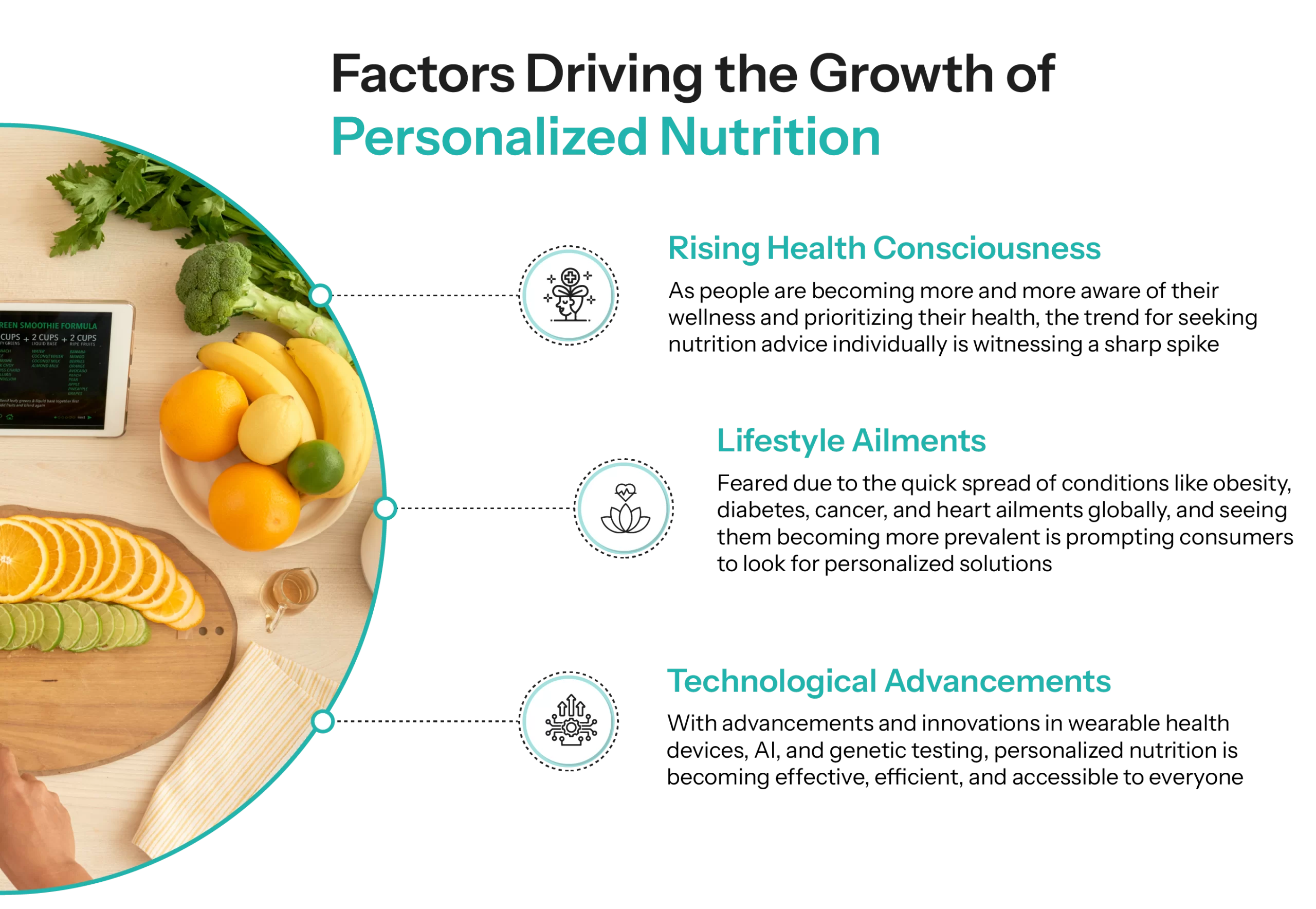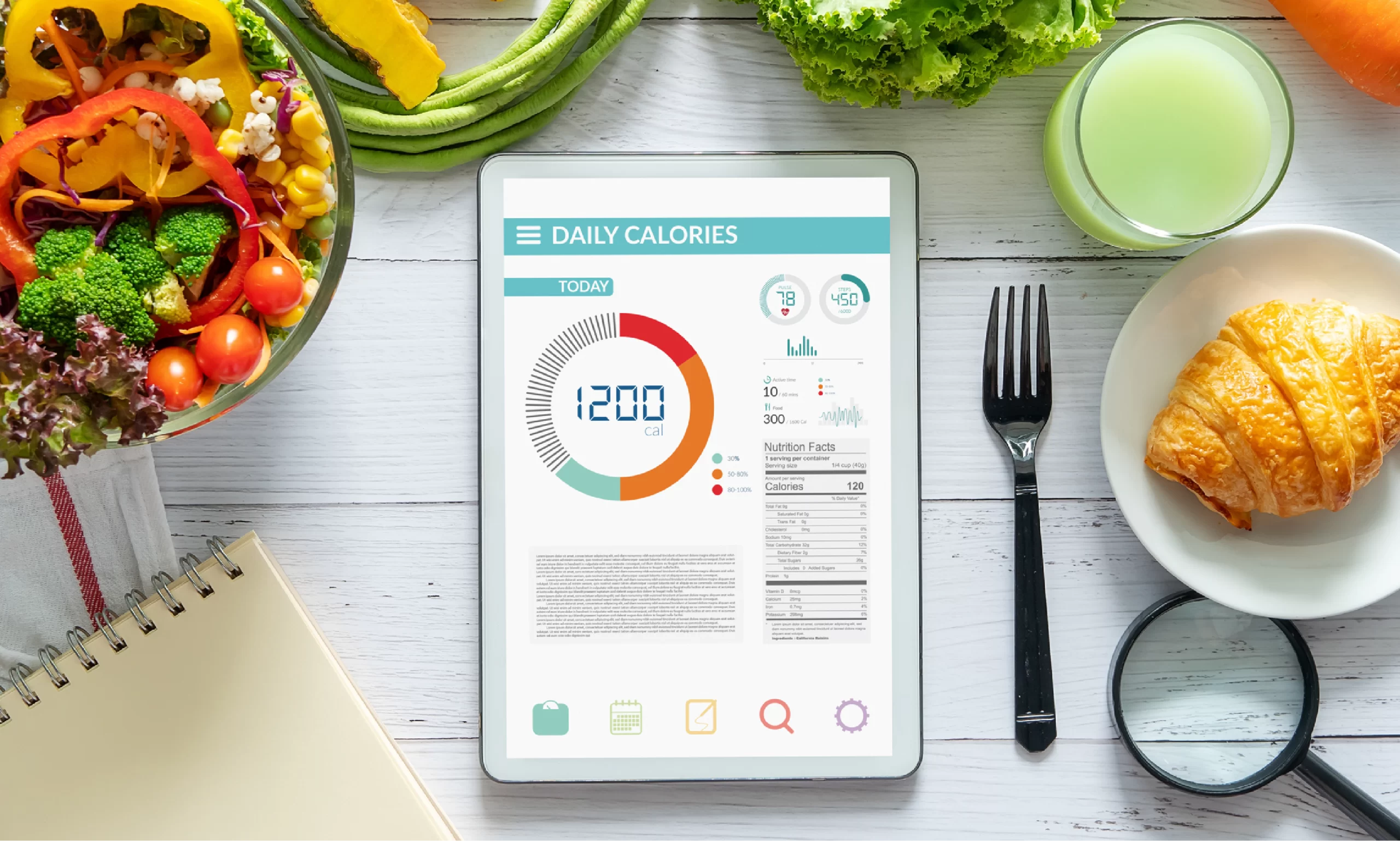Personalized Nutrition: A Sustainable Future
The personalized nutrition market represents a significant growth opportunity driven by technological advancements and shifting consumer perceptions. Other key enablers facilitating the precise tailoring of dietary interventions include wearable technology, genomics, and artificial intelligence. Embracing personalization is a strategic imperative for food industry players now as it will be catalytic in redefining their value propositions, gaining a competitive edge, and cultivating new revenue streams. However, this paradigm shift mandates swift R&D efforts, data-driven product development, and strategic collaborations.
The blog dives further into the upside-moving world of personalized nutrition, the role of AI, recent trends, future possibilities, and sustainability.
The Market Surge: A Growing Industry
The personalized nutrition market is here to stay and is poised to lead the way. In 2024, the global market valuation was approximately $9.01 billion. Based on recent developments, it is expected to more than double by the end of this decade, reaching an estimated valuation of $21 billion at a compound annual growth rate (CAGR) of 15.8%. This robust growth estimation can be attributed to the expanding acceptance and accessibility of wearables, advancements in genomics, and the increasing integration of AI across various spheres of the health and wellness food segment.
Key Factors Driving the Growth Are:

Innovations in genetic testing, AI, and wearable devices are making personalized nutrition more accessible and effective than ever before.
The Role of AI: Revolutionizing Personalization
Personalized nutrition is at the threshold where AI is the core of its growth and development, channeling science-backed approaches for better health, steps ahead from being a niche trend. AI adds the premium functionality of analyzing humongous data and provides ways to consume nutrition through diets.
1. Data-Driven Decisions
AI has the potential to process multifold data, including lifestyle habits, patients’ genetic profiles, and track real-time health metrics, offering companies opportunities to create personalized nutrition plans with accuracy. Notably, AI algorithms can provide suggestions after assessing consumers’ bodies and responses to certain diets or food types. The ability to analyze convoluted datasets allows for precise dietary consumption compared to conventional methods.
2. Adaptive Learning
AI takes a dynamic approach and adjusts over time to the responses accumulated from individuals. It uses those learnings and changes diets accordingly. Thus, nutrition plans evolve based on real-time data, meeting patients’ goals and requirements.
3. Smart Supplements
The market for personalized supplements is also shaping up following the rise of AI in the sector. Artificial intelligence can acquire data on lifestyle factors, genetic predispositions, and nutrient deficiencies, study them, and recommend custom supplements that can quench nutritional gaps, enhance performance, and optimize consumers’ health.
4. Integration with Wearable Technology
The integration of AI with wearable devices assists in the real-time monitoring and tracking of health metrics and physical activity performed by an individual over a specific duration. That can aid in making advanced personalized nutrition charts. The combination of AI and wearable technology is formidable, offering precise dietary recommendations by adapting health data.
5. Nutritional Deficiency Identification
Nutritional deficiencies in minerals and vitamins can be detected through AI with pinpoint accuracy. It evaluates dietary intakes and facilitates targeted interventions to improve the health of individuals following dietary restrictions. For example, if someone aims to lower cholesterol, AI can create a plan emphasizing heart-healthy foods while avoiding those that could raise cholesterol levels. The AI system ensures a balanced intake of macronutrients and micronutrients tailored to the user’s specific needs.
6. Continuous Learning and Adaptation
Artificial intelligence systems can learn from feedback, orders, and data. This helps them refine suggestions as time passes and keep providing evolved solutions based on an individual’s health status.
Recent Trends in Personalized Nutrition
With the expansion of the personalized nutrition industry, numerous trends are mushrooming, exhibiting innovation and potential in the sector.
1. Functional Foods and Nutrigenomics
The personalized nutrition trend involves functional food development crafted to offer health advantages beyond basic nutrition. It also includes nutrigenomics, which assesses the interaction between genes and diet. The prime motive of these fields working together is to promote general wellness and subside health issues like diabetes and obesity.
2. Innovative Food Technologies
Technologies like 3D food printing are trending to allow the creation of tailored food for individuals’ nutritional needs. It enables explicit adjustments in flavor and food texture for those who require a specific diet following restrictions. Moreover, it helps in food waste management due to the targeted use of ingredients.
3. Wearables and Health Apps
Wearable gadgets are finding ground in the personalized nutrition category as products like Apple Watch, Fitbit, and Oura Ring are getting integrated into the system. These devices track sleep, daily physical activity, and other health metrics, offering data insights for better diet plans. Also, they can be integrated with AI for real-time information and nutrition recommendations on the go.
Besides, mobile health apps like MyFitnessPal and others further allow users to track their food intake, enabling insights that AI can use to refine personalized plans.
4. Genetic and Microbiome Testing
Genetic and microbiome testing are in trend, helping consumers understand their nutritional requirements based on their unique genetic makeup. Companies like 23andMe and DNAfit encashing in on the movement by offering genetic testing
Similarly, microbiome analysis is receiving a significant response, following the awareness that gut health has a major in digestion, immunity, and mental health. Testing for gut bacteria can help create highly customized nutrition plans focused on improving digestion and overall health.
5. Personalized Meal Plans and Delivery
Personalized meal delivery services like Eat Love and Persona Nutrition are growing in popularity. These services take into account dietary preferences, health goals, and nutritional needs, offering ready-to-eat meals or DIY meal kits designed just for you. By reducing the guesswork, these companies allow consumers to stick to their personalized nutrition plans with ease.
The Future Outlook Segment
Stakeholders aiming to harness the evolving opportunities presented by personalized nutrition could adopt a few measures:
- Strategic Investment in Data-driven and AI Personalization: To process larger volumes of data on consumer health, genetic data, and lifestyle, and develop adaptive algorithms, it is essential to invest in AI and data-driven personalization
- Integrate Wearable Health Apps and Technology: By integrating wearable devices and mobile health apps that monitor dietary intake, sleep, and physical activity, individual data can be fed into AI systems for real-time nutrition guidance
- Expanding the Scope of Microbiome Testing, Nutrigenomics, and Functional Foods: Systemic investments in functional food and nutrigenomic solutions tailored to specific health concerns could pave the way forward. Companies could diversify into microbiome and genetic testing services or collaborate with established providers for deeper personalization as per individual biological profiles
- Innovation in Product Development and Delivery: Development of personalized meal kits and supplements that employ AI to adjust formulation and recommendations based on ongoing health preferences. It is also recommended to explore advanced food technologies, such as additive printing, to customize food products
- Prioritize Sustainability Across the Value Chain: Sustainable sourcing of ingredients and transparency throughout the value chain, with a key emphasis on plant-based proteins, eco-friendly packaging, recyclable materials, and portion-controlled meals, will be pivotal in reducing the environmental impact
Sustainability: A Critical Focus
Sustainability will always be the first criterion as the personalized nutrition market grows. Moreover, startups and established companies are shaping the market, where health is being optimized, but not at the expense of the planet or the Earth’s health.
– Sustainable Sourcing
The focus of several companies is shifting toward sourcing sustainable and eco-friendly ingredients, including ethically farmed proteins, and plant-based options that can create repute for their brands and gain traction from the targeted consumers.
– Reducing Food Waste
The food reduction process is one of the biggest benefits offered by personalized nutrition. Food waste can be minimized by offering the correct amount of food and nutrients to every individual. Most importantly, a personalized food kit can ensure less food goes into the trash.
– Eco-Friendly Packaging
Personalized nutrition meals have to be packed in a sustainable package as a futuristic approach to finding more takers, and as the demand for personalized nutrition is increasing, the push for sustainable packaging has become quintessential. Many startups and companies are investing in recyclable, biodegradable, and reusable packaging to diminish their environmental footprint. Moreover, some are exploring innovative packaging solutions like edible or compostable materials.
– Plant-Based and Alternative Proteins
The rise in plant-based diets for the consumption of protein is one of the key trends in sustainable personalized nutrition. Also, different personalized nutrition plans suggest plant-based foods, encouraging a lower environmental impact than animal-based products. Moreover, alternative protein sources like insect protein and lab-grown meat are gaining attention, offering additional sustainable options.
Conclusion
Personalized nutrition is at the forefront of the growing inclination towards sustainable, healthy eating patterns. As the R&D trajectory of microbiome testing, innovative food technologies, genetic testing, and artificial intelligence continues to evolve, the accessibility, accuracy, and impact of customized nutrition will penetrate deeper for users. Looking ahead, the convergence of personalized nutrition with remote health monitoring, precision medicine, and functional foods will enable more targeted interventions for optimal performance, longevity, and disease prevention. Lastly, as AI refines the adaptive and predictive capabilities of personalized nutrition, the vision of food fit for each individual’s biology will become a reality.
Let's Take the Conversation Forward
Reach out to Stellarix experts for tailored solutions to streamline your operations and achieve
measurable business excellence.



